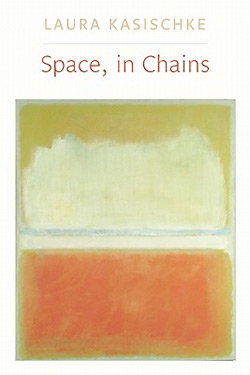Space, in Chains
by Laura Kasischke
reviewed by Ellen Davis
One of Mark Rothko’s floating rectangles is a fitting cover image for Laura Kasischke’s new book of poems, Space, in Chains. Just as his shapes are defined by formal qualities—line and color—so her poems are formally defined by syntax, line, and internal rhyme.
Kasischke is interested in family, in death, in myth, in riddles, in stories, in gods, and in God. She has published eight books of poems and eight novels, one of which was turned into a movie with Uma Thurman, no less. Kasischke’s range and depth are apparent in everything she writes. She mixes abstract and narrative approaches to her poetry and her work is highly postmodern and fragmentary.
In the first section of Space, in Chains—there are three—Kasischke describes her ailing father:
This tender moment when my father
gives a package of cookies to my son.
They have been saved
from the lunch tray
for days.
It’s typical of her method that she should choose a harsh image along with a sentimental one. In “The Key to the Tower,” the poet includes three-line stanzas interspersed with single-line ones. She begins with mystery, which she sustains throughout:
There was never
There was never
A key to the tower
And later:
It was a dream
It was a dream
A mosquito’s dream
The abstract images become increasingly vivid. Her interest in jokes and riddles is apparent here; what could a mosquito’s dream be?
The title poem, “Space, in chains,” begins “Things that are beautiful, and die.” As for many poets, beauty and death are major themes for Kasischke. Later, she offers her ars poetica in scattershot observations:
It’s all space, in chains—the chaos of birdsong after a rainstorm, the steam
rising off the asphalt, a small boy in boots opening the back door, stepping
out, and someone calling to him from the kitchen:
Sweetie, don’t be gone too long.
The postmodern aesthetic mixes personal images with more unusual ones, something Kasischke does throughout the book. The effect is one of surprise and the purpose to highlight the stories and the language; Ashbery is clearly an influence here.
In the second section, the poem “Wormwood” begins,
That a star in heaven
Might have poisonous feathers.
That an angel might cast it for
us far into the sea . . .
Here Kasischke balances her interests in the metaphysical and the literal. There’s a very funny poem in this section about a woman who steals the poet’s shoes while she is at the gym. Again, this is representative of her range and her humanity, the mix of the postmodern with the personal. Another poignant poem in this section is called “Cigarettes”: “Back then, we smoked them. In / Every family photo someone’s smoking.” Two lines with so much story in the images.
In the lengthy third and final section of the book, Kasischke includes a poem called “Animal, vegetable, mineral, mist,” which ends with one of her many references to her father:
And then
through my weird tears
a clear vision
at the center of the others:
My father
and the way for decades he drank his beer
beneath one bare bulb in a basement, like
a man desperately struggling to drown
a pale deer in a shallow pool.
As the image of the deer suggests, Kasischke is a wildly imaginative writer. Her poems are memorable, often funny, always profound. She is a writer to savor and to admire.
Published on March 18, 2013

